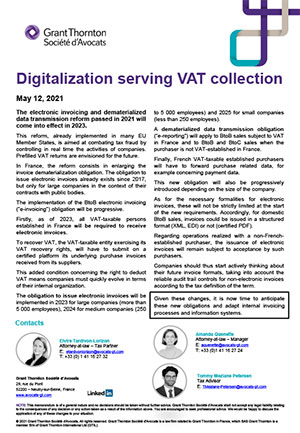-
Tax Policy Management
Tax Policy Management
-
Growth Management
Growth Management
-
Tax audit and litigation
Tax audit and litigation

-
Definition of a strategic and secure transfer pricing structure
Definition of a strategic and secure transfer pricing structure
-
Assistance in the development of international activities and operational reorganisations – “Business restructuring”
Assistance in the development of international activities and operational reorganisations – “Business restructuring”
-
Defense of practices and assistance in the context of tax audits and their follow-up from a litigation viewpoint
Defense of practices and assistance in the context of tax audits and their follow-up from a litigation viewpoint
-
Annual declaration and documentation obligations
Annual declaration and documentation obligations

-
Domestic and international VAT applicable to your company's flow
Domestic and international VAT applicable to your company's flow
-
Banking and financial VAT, VAT in the insurance sector
Banking and financial VAT, VAT in the insurance sector
-
VAT related to real estate registration fees
VAT related to real estate registration fees
-
VAT in the public and non-profit / association sector
VAT in the public and non-profit / association sector
-
Tax audit, tax litigation and relations with the Tax authorities
Tax audit, tax litigation and relations with the Tax authorities
-
Applicable rules for invoicing
Applicable rules for invoicing
-
Customs issues related to your company's international flows
Customs issues related to your company's international flows
-
French VAT registration and compliance obligations
French VAT registration and compliance obligations
-
Payroll tax
Payroll tax
-
Other indirect taxation
Other indirect taxation

-
Company transfer diagnosis
Company transfer diagnosis

-
Distribution strategy : Implementing and structuring
Distribution strategy : Implementing and structuring
-
Distribution activities digitalisation
Distribution activities digitalisation
-
Relations between suppliers and distributors
Relations between suppliers and distributors
-
Contractual policy : etablishing and structuring
Contractual policy : etablishing and structuring
-
Controls and litigation regarding payment terms
Controls and litigation regarding payment terms
-
Organising and securing commercial relations with consumers
Organising and securing commercial relations with consumers
-
Data protection - GDPR
Data protection - GDPR
-
Commercial Leases
Support in the management and contract management of commercial leases.

-
Traditional Services offered
Traditional Services offered
-
Health at work and quality of life at work
Health at work and quality of life at work
-
HR Management Audit
HR Management Audit
-
HR Engineering and People Change
Implementing managerial solutions in line with the company's strategic challenges
-
Management of HR compliance and internal investigations (harassment, discrimination, and whistleblowing)
Management of HR compliance and internal investigations (harassment, discrimination, and whistleblowing)

-
Advice on legal structuring
Advice on legal structuring
-
Day to day company management
Day to day company management
-
Companies reorganisation
Companies reorganisation
-
Mergers & Acquisitions - Private Equity
Mergers & Acquisitions - Private Equity
-
Changes in shareholder structure - Securities issue
Changes in shareholder structure - Securities issue
-
Governance and legal risks management
Governance and legal risks management

-
Development of an international mobility policy
Development of an international mobility policy
-
Coordination of reporting obligations for employees in a mobility situation
Coordination of reporting obligations for employees in a mobility situation
-
Advice on social security
Advice on social security
-
Assistance in labour law
Assistance in labour law

-
Management and protection of your portfolio of property rights
We put the most appropriate protection policy in place for our clients’ intellectual property rights.
-
Securing your projects: advisory and drafting of agreement services
We advise you on the feasibility of your project and the securing of your intellectual property and IT rights.
-
Enforcement of your rights: pre-litigation and litigation
Enforcement of your rights: detection of infringement, pre-litigation and litigation

The electronic invoicing and dematerialized data transmission reform passed in 2021 will come into effect in 2023.
This reform, already implemented in many EU Member States, is aimed at combating tax fraud by controlling in real time the activities of companies. Prefilled VAT returns are envisioned for the future.
In France, the reform consists in enlarging the invoice dematerialization obligation. The obligation to issue electronic invoices already exists since 2017, but only for large companies in the context of their contracts with public bodies.
The implementation of the BtoB electronic invoicing (“e-invoicing”) obligation will be progressive.
Firstly, as of 2023, all VAT-taxable persons established in France will be required to receive electronic invoices.
To recover VAT, the VAT-taxable entity exercising its VAT recovery rights, will have to submit on a certified platform its underlying purchase invoices received from its suppliers.
This added condition concerning the right to deduct VAT means companies must quickly evolve in terms of their internal organization.
The obligation to issue electronic invoices will be implemented in 2023 for large companies (more than 5 000 employees), 2024 for medium companies (250 to 5 000 employees) and 2025 for small companies (less than 250 employees).
A dematerialized data transmission obligation (“e-reporting”) will apply to BtoB sales subject to VAT in France and to BtoB and BtoC sales when the purchaser is not VAT-established in France.
Finally, French VAT-taxable established purchasers will have to forward purchase related data, for example concerning payment data.
This new obligation will also be progressively introduced depending on the size of the company.
As for the necessary formalities for electronic invoices, these will not be strictly limited at the start of the new requirements. Accordingly, for domestic BtoB sales, invoices could be issued in a structured format (XML, EDI) or not (certified PDF).
Regarding operations realized with a non-French-established purchaser, the issuance of electronic invoices will remain subject to acceptance by such purchasers.
Companies should thus start actively thinking about their future invoice formats, taking into account the reliable audit trail controls for non-electronic invoices according to the tax definition of the term.
Given these changes, it is now time to anticipate these new obligations and adapt internal invoicing processes and information systems.

















